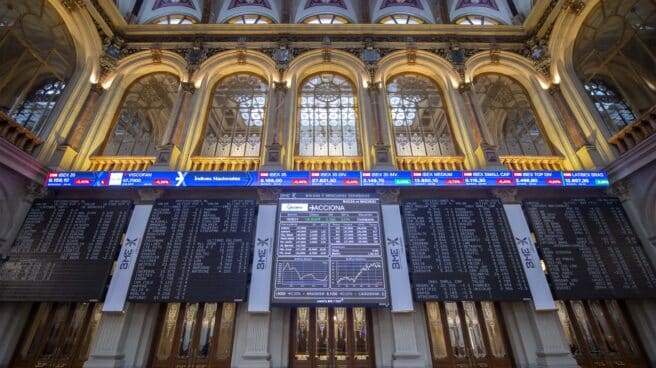

Image of the interior of the Madrid Stock Exchange
Capricorn 35 He doesn’t live through his best moments and it was with this Wednesday crash that he closed the worst streak in his history with eleven consecutive sessions in the red. Fear of an economic recession caused by most aggressive rate hike to curb inflation makes a selective trade with the waterfall. With this fall, the national index exceeded the last record in the red, which was ten sessions with pullbacks recorded in November 2017.
It’s August 31st the index fell by 1.17% to 7886 points, the lowest level since July 14, when it closed below technical support at 7804 points. In the monthly accumulation for August, 3.3% of electives remained. The Ibex 35 registered this series of falls, weighed down by the forecast for more aggressive rate hikes by central banks. Electrical networkwhich fell 3.54%, was the session’s red light. Endes, down 2.62%, accompanied it to the bottom of the table. Although the fall Inditexscoring 2.66% pushed the Electors the most to close in red.
The stock markets of the Old Continent also saw widespread declines. Thus, the German Dax 30 fell by 0.97%; French Cac 40, 1.37%; and FTSE MIB Milano, 1.29%. The main news that affected the European markets was the leading indicator of August inflation in the euro area, which rose to 9.1% compared to 8.9% in July. The rise represents the highest price rise in the eurozone ever and is more than four times the price stability target set by the European Central Bank (ECB) at 2%, whose Board of Governors will meet again this week. that since the market is already discounting, it may be more aggressive in raising rates (some experts are already pointing to a 0.75% increase).
Silvia Dall’Angelo, senior economist at Federated Hermes, says headline inflation in the eurozone “will continue to rise in the short term and is likely to peak at around 10% in the fourth quarter of this year.” Regarding the ECB, Dall’Angelo believes that “today’s inflation report reinforces case for a 75 basis point rate hike – instead of 50 – at the ECB meeting next week”.
Azad Zangana, senior European strategist and economist at Schroders, notes that they have raised their inflation forecast for the eurozone this year from 6.6% to 7.3% and from 2.4% to 3.1% for 2023. In addition, they predict that inflation in Germany will exceed the level of the region, rising to 7.6% in 2022 and 3.5% in 2023. “Inflation is now one of the biggest problems for households when assessing their financial situation”he assures. And he adds that as central banks struggle to control high inflation, “monetary policy is constrained, leaving governments to ease the pain of higher inflation as much as possible.”
in other markets, barrel of brent, by comparison in Europe, falls 0.7% to $97.16. In its turn, barrel WTIfor comparison, in the US it falls by 0.43% to $91.25.
Secondly, Euro rises in its exchange against the dollar by 0.5% and is already quoted at 1006 US dollars.
Source: El Independiente